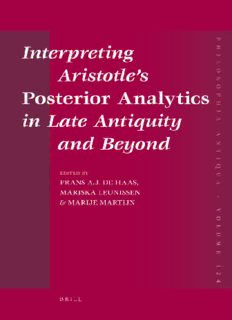
Interpreting Aristotle's Posterior Analytics in Late Antiquity and Beyond (Philosophia Antiqua) PDF
Preview Interpreting Aristotle's Posterior Analytics in Late Antiquity and Beyond (Philosophia Antiqua)
Posterior Analytics Interpreting Aristotle’s in Late Antiquity and Beyond Philosophia Antiqua A Series of Studies on Ancient Philosophy PreviousEditors J.H. Waszink† W.J. Verdenius† J.C.M. Van Winden Editedby K.A. Algra F.A.J. de Haas J. Mansfeld C.J. Rowe D.T. Runia Ch. Wildberg VOLUME124 Interpreting Aristotle’s Posterior Analytics in Late Antiquity and Beyond Editedby Frans A.J. de Haas, MariskaLeunissen and MarijeMartijn LEIDEN•BOSTON 2010 Thisbookisprintedonacid-freepaper. LibraryofCongressCataloging-in-PublicationData InterpretingAristotle'sPosterioranalyticsinlateantiquityandbeyond/editedbyFransA.J.de Haas,MariskaLeunissen,andMarijeMartijn. p.cm.–(Philosophiaantiqua;v.124) Includesbibliographicalreferencesandindex. ISBN978-90-04-20127-9(hardback:alk.paper) 1.Aristotle.Posterioranalytics.2.Logic.3.Knowledge,Theoryof.4.Definition(Philosophy) I.Haas,FransA.J.de,1963-II.Leunissen,Mariska,1979-III.Martijn,Marije. B441.I582010 160–dc22 2010050006 ISSN: 0079-1687 ISBN: 9789004201279 Copyright2010byKoninklijkeBrillNV,Leiden,TheNetherlands. KoninklijkeBrillNVincorporatestheimprintsBrill,HoteiPublishing, IDCPublishers,MartinusNijhoffPublishersandVSP. Allrightsreserved.Nopartofthispublicationmaybereproduced,translated,storedin aretrievalsystem,ortransmittedinanyformorbyanymeans,electronic,mechanical, photocopying,recordingorotherwise,withoutpriorwrittenpermissionfromthepublisher. AuthorizationtophotocopyitemsforinternalorpersonaluseisgrantedbyKoninklijkeBrillNV providedthattheappropriatefeesarepaiddirectlytoTheCopyrightClearanceCenter, 222RosewoodDrive,Suite910,Danvers,MA01923,USA. Feesaresubjecttochange. CONTENTS Preface ................................................................. vii Introduction ........................................................... ix parti conceptformationinposterior analyticsii TheAncientCommentatorsonConceptFormation ................. 3 RichardSorabji Proclus’CriticismofAristotle’sTheoryofAbstractionand ConceptFormationinAnalyticaPosterioraII.................. 27 ChristophHelmig Eustratius’CommentsonPosteriorAnalyticsII ................... 55 KaterinaIerodiakonou RogerBacononExperiment,InductionandIntellectinhis ReceptionofAnalyticaPosterioraII ............................ 73 PiaA.Antolic-Piper part ii metaphysicsasa science AlexanderofAphrodisiasontheScienceofOntology ............... 101 MaddalenaBonelli Les‹SecondsAnalytiques›danslecommentairedeSyrianussurla ‹Métaphysique›d’Aristote .......................................... 123 AngelaLongo part iii demonstration,definitionandcausation AlexanderandPhiloponusonPriorAnalyticsI–:IsThere TensionbetweenAristotle’sScientificTheoryandPractice? ...... 137 MiiraTuominen vi contents TwoTraditionsintheAncientPosteriorAnalyticsCommentaries... 155 OwenGoldin AristotleandPhiloponusonFinalCausesinDemonstrationsin PosteriorAnalyticsII............................................. 183 MariskaLeunissen AristotleonCausationandConditionalNecessity:Analytica PosterioraIIinContext.......................................... 203 InnaKupreeva Bibliography ........................................................... 235 IndexNominum ....................................................... 255 IndexLocorum ........................................................ 258 PREFACE This volume brings togethera number ofpapers connectedto thepro- gramFromnaturalphilosophytoscience:–fundedbytheEuro- peanScience Foundation. In thatframeworktheteam ‘The anatomyof science: logic and method’, led by De Haas, organised two workshops. ThefirstwasorganisedbytheeditorsofthisvolumeanddevotedtoInter- pretationsofAristotle’sPosteriorAnalytics(Leiden,Netherlands,–June );thesecondwasdevotedtoIntuitiveKnowledge,Induction,andthe Role of Experiment (Maynooth, Ireland, – June ). The editors gratefully acknowledgethefinancialsupportprovidedbytheESFwith- out whichthis enterprisewould not have been possible.Martijn’s work on this volume has in part been made possible by a Veni-grant of the NetherlandsOrganizationforScientificResearchNWO,project-- . TheMaynoothconferencewasorganizedbythelateJohnCleary,who, with the help of his Maynooth colleagues, saw it through successfully despitethefactthathiswifehadjustfallenseriouslyill.Hisunfailingsup- portfortheESFproject,hisintensecommitmenttotheunderstandingof ancientphilosophy,butalsohischeerfuljokesandremarkabletaleswill alwaysberememberedbyeveryonewhoparticipatedintheworkshops. Thisvolumeisdevotedtohismemory. Thepapersweselectedforpublicationweresubstantiallyrevisedand updatedtothecurrentstateofresearch.OwenGoldin,whoparticipated intheLeidenworkshop,kindlyacceptedtheinvitationtoprepareanew paper,sincehisoriginalpaperwasalreadyinpressatthetimeofdelivery (Goldin ). In the introduction and bibliography we have aimed at providingaccesstotherapidlygrowingfieldofthereceptionofthePos- teriorAnalyticsinlaterGreekAntiquity,andtheByzantine,Arabic,and LatinMedievalphilosophicaltraditions.Wehavenotaimedatproviding acompletebibliography,butweareconfidentthatthescholarshipwedid includewillprovideboththegeneralandthespecializedreaderwiththe meanstopursuehisorherinterests. Theeditorsincurredanumberofdebtswhilepreparingthisvolume. It will be hard to compensate for the patience of our contributors, and we are truly grateful that they bore with us until we were able to bring the project to the press. James Lesher and Henrik Lagerlund kindly viii preface informed us about forthcoming publications that we were thus able to include in our bibliography. For last minute advice on parts of the introductionweareindebtedtoKaterinaIerodiakonou,MicheleTrizio, andthemembersoftheresearchgroupAncientandmedievalphilosophy attheVUUniversityAmsterdam. FransdeHaas MariskaLeunissen MarijeMartijn Leiden,thMarch INTRODUCTION One of the major contributors to research on the Posterior Analytics, JonathanBarnes,oncewrotethatthetext“plays CinderellaintheAris- totelianpantomime”1—inthesensethatsheusedtobedisregardedbutis recentlyfollowedaroundbyahostofsuitors.WhatistrueofthePosterior Analyticsnow,hasbeentrueduringtheMiddleAges(Byzantine,Arabic and Latin) in a very specific sense.Whenmedieval philosopherswrote commentariesonAristotle’sPosteriorAnalyticstheydidnotaimatgiving anoverviewoftheworkforitsownsakeoratclarifying itsplaceinthe corpusanditsrelationtootherAristotelianworks.Instead,theymadethe textplaytheproverbialCinderellabyhavingitscrubthefloors:eitherthe commentarieshadanexternalaim,primarilythedefenseoftheologyasa science,orthecommentatorsselectedafairlylimitednumberofthemes usefultotheareasofphilosophyoftheirinterest.Therootsofthistreat- mentofthePosteriorAnalyticscanbefoundintheancientcommentary tradition,althoughthereitisstillpartofamorecomprehensiveapproach tothework. The treatment of the Posterior Analytics became an instrument in a development characteristic for the transition from natural philosophy to science, namely a progression of the awareness and sophistication of method and logical argument. Here we bring together a collection of essays that trace these developments in the discussions of scientific method and argument in the comment(arie)s on Aristotle’s Posterior Analytics and related methodological passages in the Aristotelian cor- pus. Despite the importance of these discussions the larger part of the commentarytraditiononthePosteriorAnalyticsstillremainsuncharted. Thiscollectionaimstoopenup thisnewline ofresearchbyidentifying andexploringthreeimportantstrandsofinterpretationrelatedto()the receptionofAristotle’slogicofinquiryandtheoryofconceptformation in Posterior Analytics II ; () the influence of the Posterior Analytics on the evaluation of metaphysics as a science; and () the reception of Aristotle’s theory of demonstration, definition, and causation in Poste- riorAnalyticsbookII. 1 Barnes().
